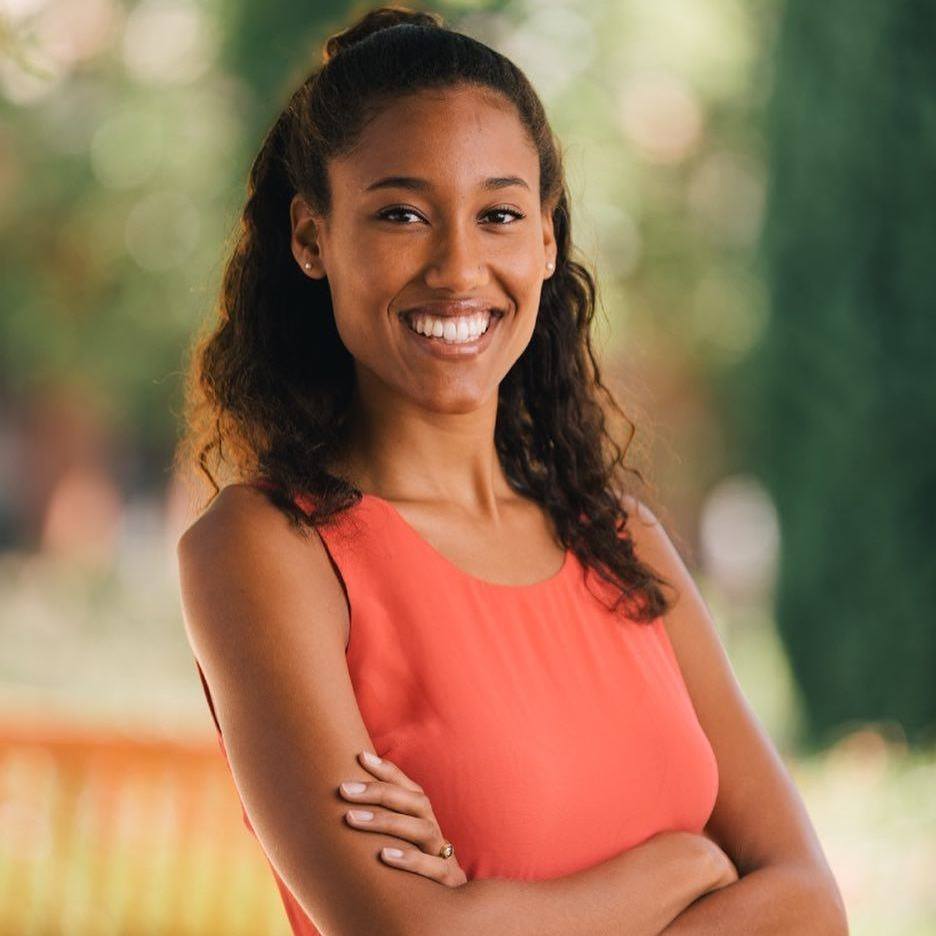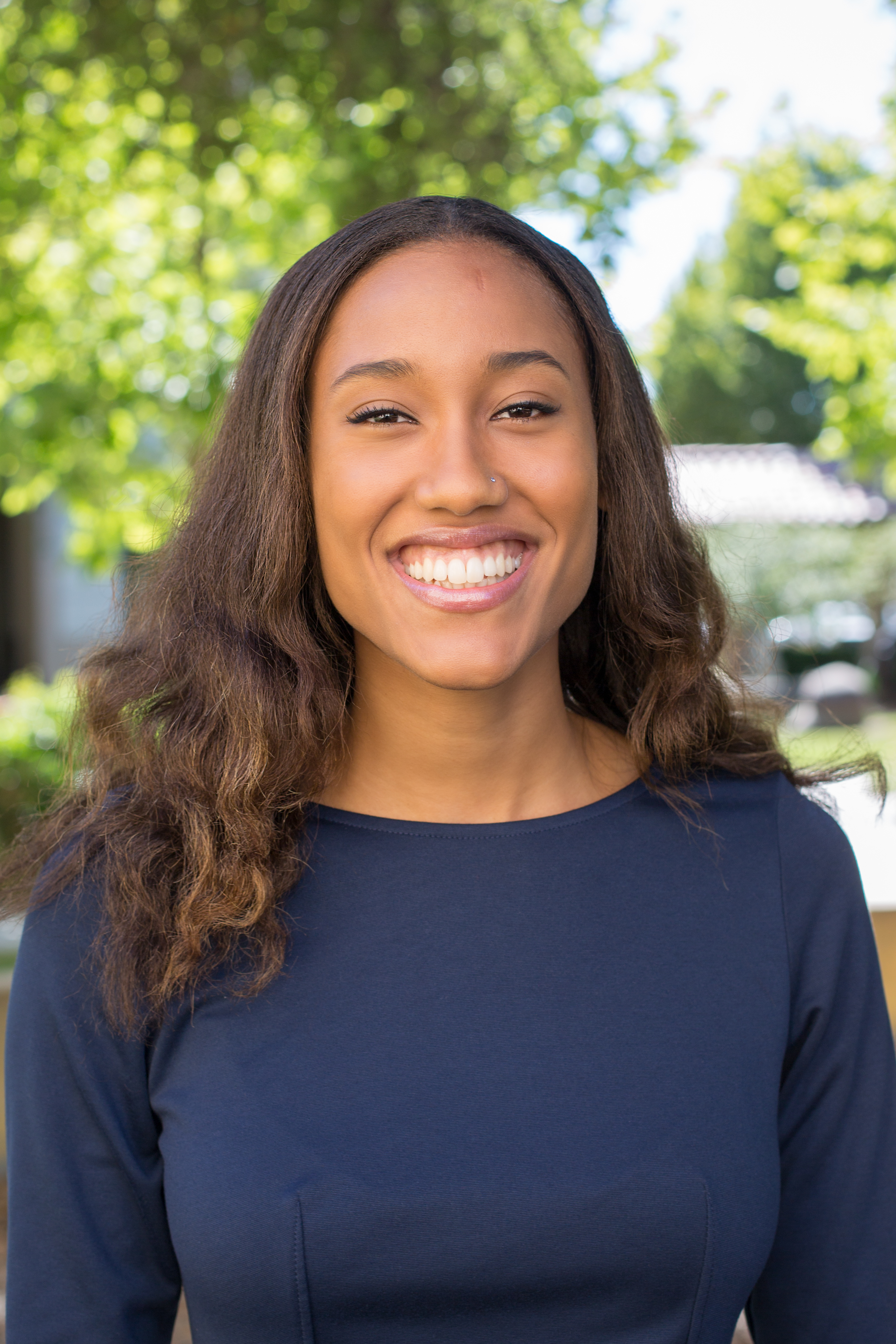
Anna Nti-Asare-Tubbs speaks about her research into the role of mothers in the struggle for race equality in the US.
Malcolm X, James Baldwin, and Martin Luther King Jr all credited their mothers in different ways throughout their lives. However, scholars have chosen to ignore that.
Anna Nti-Asare-Tubbs
The stories of the mothers of influential black thinkers and activists are powerful, but have been little studied, says Anna Nti-Asare-Tubbs [2017].
As part of her PhD in Sociology, she is researching the stories of the mothers of Malcolm X, Martin Luther King Junior and James Baldwin – Alberta King, Louise Little and Emma Berdis Jones – and plans to turn them into a mainstream book so they are more widely known and their influence and impact given the acknowledgement they deserve.
Louise Little, for instance, was born in Grenada. Her own mother became pregnant after being raped by a Scottish man when she was just 11. Louise later moved to Montreal and joined Marcus Garvey’s pan-African movement which believed in black self reliance. She wrote for the Universal Negro Improvement Association’s newspaper. After meeting her husband Earl, she moved to Michigan where Malcolm X was born. The family were pursued by white supremacists due to their activism and their house was burnt down. Malcolm X’s autobiography recounts the state of constant terror his family lived in at the time he was born. When he was six Earl was widely rumoured to have been murdered by the white supremacist group the Black Legion. The death, however, was officially recorded as a suicide so Louise did not receive any insurance, leaving the family destitute. Her children were later taken into care and Louise was put in an asylum for 25 years. She died at the age of 91.
During the course of her research, Anna has seen letters which have never before been published which Malcolm X wrote from prison to his mother where he speaks of what his mother was trying to teach him. “Malcolm X, James Baldwin, and Martin Luther King Jr all credited their mothers in different ways throughout their lives. However, scholars have chosen to ignore that,” she says.
Anna’s research is strongly linked to her own activism on race and gender issues. Married to the mayor of the city of Stockton in California, she has recently devoted a lot of energy to doing a comprehensive survey of Stockton’s women which will inform policy and investment decisions.
Work on the report began in June 2017. Anna organised countless meetings, bringing the right people together and making the case for why hard data on women was needed to back up policy work.
The report was co-authored with San Joaquin County Data Cooperative using data from the local census. Focus groups and individual interviews were set up and huge efforts were made to get the survey out to as many women as possible, including the most disadvantaged single mothers. Anna also helped to raise the money needed to do the survey. The report was completed in April and the findings are freely available. Anna says they can be used by a wide variety of policymakers and outside investors, including those who might be looking, for instance, to invest in affordable childcare, access to reproductive health advice and support for victims of domestic violence.
Observing the world
Anna had a nomadic childhood and her experience of moving around as a child meant she always felt like she was ‘the other’, observing different cultures, including in the US. It made her deeply aware of issues around gender and race.
She was born in Albuquerque in New Mexico. Her parents were international law lecturers and the family moved around the world, living in a number of countries, from Estonia, Russia and Dubai to Mexico, Azerbaijan and the US. Anna’s parents made a point of sending their three children to local schools so they could learn the culture and language of the country they were in. “It was incredible to see the world that way,” says Anna. “I was a very curious child and loved to sit and watch everything happening around me. I loved learning. I was a proud nerd.”
In her teens the family moved back to the US to Wyoming and when they moved again Anna went to boarding school in Indiana. She did advanced Physics and Maths, but also loved reading and writing. When she got admitted to Stanford she opted to do a degree in medical anthropology which merged science and social sciences and focused on the interaction between culture and health. “My mum said I should do anthropology because I loved observing the world. My dad wanted me to be a doctor,” she says. “The course meant I could keep hold of many of my passions.”
Anna did a four-year honours course, finishing with a thesis on sex education in the US based on research of young people’s experiences of sex education. It investigated how a country’s approach to speaking about sex education directly affected young women’s health. The research got her interested in reproductive rights and in intersectional feminism, although she had already noticed gender inequities as a child.
Anna’s research work on sex education started in her second year when she won a grant to do research on an independent project. The same year she led a class on women’s health which included trips to the state capital to talk about women’s health. She also took part in fundraising activities for women’s health clinics in San Francisco.
Anna was active in black politics too. She was co-president of the Black Student Union in her second year and sought to link her student activism to the broader racial equality movement.
Gender studies
Anna’s work on sex education made her realise she needed to deepen her knowledge of feminism so she applied to do an MPhil in Gender Studies at the University of Cambridge. She was drawn by the university’s multidisciplinary approach to the subject. Her dissertation focused on the ways in which intersectional feminist theory being taught in high school could respond to the need for culturally relevant pedagogy.
Anna complemented her research with teaching black feminist theory to 16- and 17-year-old students of colour at a high school in Stockton, California. It was around the time of the killing of Trayvon Martin in Florida. “I wanted to bring black feminist theory to younger populations. From my teaching I could see how it changed students and made them aware that they had agency, despite being told that they didn’t,” she says. “For them gender and race theory was about their day to day survival. It wasn’t academic.”
The students petitioned for her to stay at the school and she was offered a full-time job after completing her MPhil. She stayed for two years and taught a course on ethnic studies and black feminist and chicano literature which students could use for a college credit. Anna says the experience was personally enriching . “The students taught me and they surprised me a lot,” she says. “Especially the young men. They were so excited to learn about black feminism. It taught me not to make assumptions about boys and about the value of giving them opportunities to become better men. Young men are really important to the larger movement for race and gender equality and they must be included. They want to be told the truth.”
Anna decided after two years that she wanted to return to academia and she moved to the Sociology Department for her PhD. She wanted to focus on the different ways communities of colour claimed education when it was denied to them and in particular on the role of mothers. She was influenced by the mothers of the young people she had been teaching and by her husband’s mother who was a young single parent. Anna’s husband Michael is mayor of Stockton and says he would not be who he was if it were not for the decisions his mother took when he was a child.
Michael has been mayor for the last two years. Anna has tried to mould her role as the mayor’s wife into something she can be proud of. She has looked to align that role with her research interests.
“When I went to debates no-one was talking about women,” she says. “There was a lack of focus on gender equity. I told my husband that we have to do something for women. That was the seed of the report on women.”
Over the last year Anna has been based in the UK doing her PhD and has been coordinating everything remotely. She is now firmly focused on her fieldwork, doing interviews in the US. Anna hopes to publish her research as a mainstream book along the lines of Hidden Figures. It will be her first non-fiction work – she is currently editing her first novel. She plans to finish her interviews with family members and friends in the next few months and to start writing by March. “Tracing the stories of these mothers tells us so much about American society,” she says. “Mothers are not given the credit they deserve.”

Anna Malaika Ntiriwah-Asare
- Alumni
- United States
- 2017 PhD Sociology
- King's College
Spending the first half of my life traveling from country to country including Dubai, Estonia, Mexico, Sweden, and Azerbaijan, among others, fostered a deep appreciation in me for the tremendous diversity of the world. However, in every place I noticed the ways in which narratives differed based on the perspective of the storyteller and how the national narrative depended on those with the most power. Studying Medical Anthropology, and Multidisciplinary Gender Studies in my BA and MPhil programs respectively, in addition to spending my last two years teaching Ethnic Studies to high school students in Stockton, CA, have been a part of my mission to elevate the status of marginalized narratives. As a PhD student in Education at Cambridge, I will focus on the role education has played in suppressing Black women’s narratives and how Black women have still thrived in academic spaces despite this challenge. As a Gates scholar I will use this knowledge to facilitate more inclusive learning environments and curricula.
Previous Education
Stanford University
University of Cambridge












